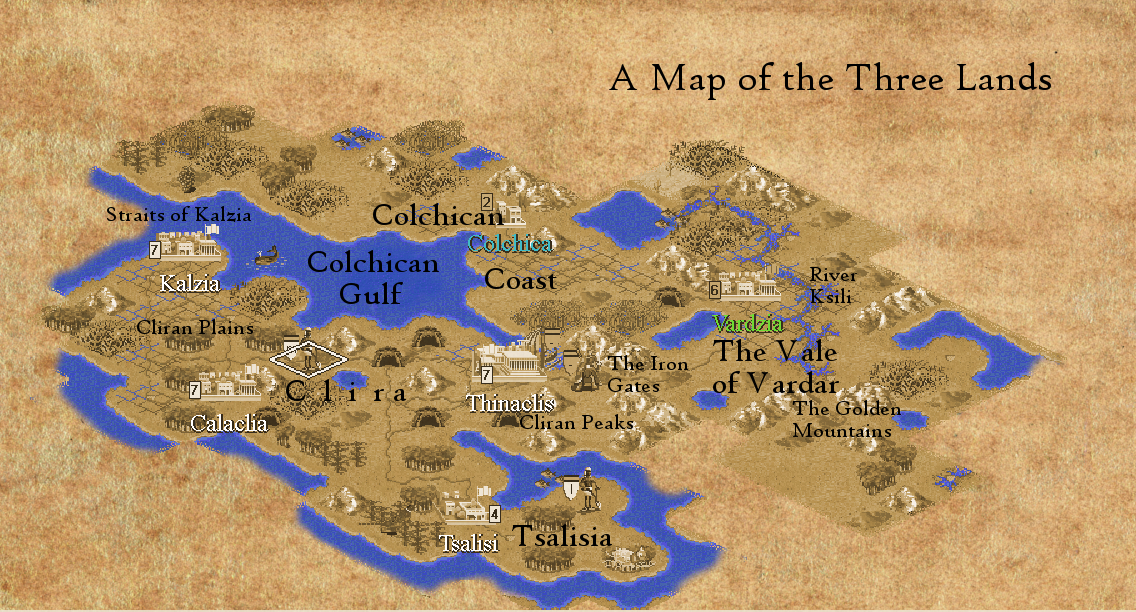The Chronicle of Alamer, First Skoutha of the Thinaclian TempleA Civ II: War of Realms AAR
I, Alamer, being first Skoutha of the temple of Tsaltsa in the gardens of Thinaclis, am the writer of this account of the history of the world. It falls to the writer of history to be the bearer of a candle-flame: and by candle-flame I write these words, without fear and without joy, without enmity or friendship, as a testament to those who have gone before and the great deeds of friend and foe alike. It is the duty of the chronicler to write an account that is bereft of that of which mankind is most capable. The chronicler thus stands apart from nature, and rejects it, to write without emotion and present things as they were, so that the deeds of the past may be emulated or avoided, whether they were committed by friend or by foe. Such is the role of the chronicler, and such is the spirit with which I enter this account.
We exiled people, we
Talgavardatsunta, stand at the feet of gods and giants who went before; and yet we stand as tall and as proud as they. But we know we are not all the
Vardatsunta, for the yokes of other nations fall upon the necks of our fellows of the plough, though we speak the same tongue and wear the same cloth. It is my purpose in writing this to explain the scattering of the
Vardatsunta, and the origins of the wars that are waged against us, and the greatness of Thinaclis, fortress of fortresses, wonder of the world. And so must my chronicle begin.
In the beginning, the nations of the earth were scattered and wandering, and all was ruled by
Khalan, that is what we call loneliness, who drove the people apart from the creators and drove the people apart from each other, in a world where wild beasts roamed and the mountains stood rugged and tall. Gods as yet unworshipped and unborn lurked in the rivers and the trees and the lakes. Such was the world when the first sun rose, such was the world when Vardar was born unto it. Upon the banks of the Ksili was she born, the swift-flowing river, and there she grew in a world that was in fragments and bare. She named the animals and the river, the tree and the wheat-stem, and called to them, and gathered them unto her. The people of her tribe were scattered and lost, under the thrall of Khalan, but she called to them, and gathered them unto her, though she was but young in the reckoning of those days, and they came to her.
This provoked the wrath of Khalan, and the sky grew dark and angry; the river burst its banks, and the people were sorely afraid. But Vardar called a third time, and this time she called the gods, and she called three of them by name, and they came to her. She called the river-woman, cold-eyed Ksi, who calmed the waters. She called the shepherd, hoof-footed Taltsa, who gathered the animals and watched over the people. And last she called old Urshin, who grew from the crags of the mountains, and Urshin roared at Khalan. Even today their battles can be heard in the mountain passes when the sky grows dark and the booming sounds of war can be heard loud in the valleys.
Khalan was driven back, and Vardar brought the people together, and gave to them their gods and their crops, and the place where she did so is to this day, even by those who speak foreign tongues, called Vardzia. It looks over the Ksili, the swift-flowing river, and it was in that valley, the Vale of Vardar, that first men spoke our tongue and wore our cloth. Though all are now under the swords of foreign tyrants, Vardan is still their language, they cut their hair and dress just as we do, and in the small farmsteads they still scatter grain into Ksi's streams and give thanks to Taltsa for protection on the mountainside; but the crops of the Vale are taken eastwards, to cities far beyond the lands and imaginings of our people, where cruel conquerors reside.
And so we come in the narrative to the foundation of Thinaclis, wonder of the world. It is the tale among the Thinaclians that Vardar herself, as she grew old and weary, passed south through the Iron Gates and the mountains and came to the high hill that would be our city where she died. But among the people of the Vale, so I have heard, it is said that she remained in Vardzia, and that it was her second son Phoros who made the journey after her elder son Tamli inherited the lordship of the Vale. Whatever the truth of the matter is, Thinaclis became the second city of the Vardazuntines, and later Colchica the third. Such are the three old realms as we know them; the Vale, where Vardzia brings the grain and crops, Clira, the land of rock and tree, and the Colchine coast, where the olive and the vine are grown.
It was in those days that the three lands of the Vardazuntine people were at peace and grew strong and bountiful; and the first Basileos, Nikephoros, ruled over them as is recorded in the songs and stories that have been passed down to us from those earlier days.
So goes the first part of the histories, as they have been passed down to us.